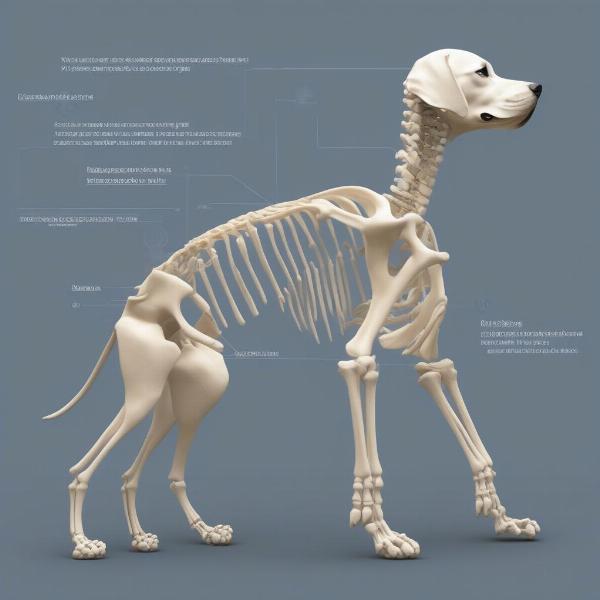Calcium is essential for dogs, playing a crucial role in bone and teeth development, muscle function, nerve transmission, and blood clotting. While a balanced diet typically provides sufficient calcium, certain situations may require supplementation. This guide explores the benefits, risks, and best practices for using calcium tablets for dogs.
Understanding the Importance of Calcium for Dogs
 Calcium is vital for strong bones in dogs
Calcium is vital for strong bones in dogs
Calcium is a vital mineral for dogs of all ages, but it’s especially crucial for puppies and growing dogs. Adequate calcium intake ensures proper bone development, preventing conditions like rickets. In adult dogs, calcium helps maintain bone density and prevents osteoporosis, particularly in senior dogs. Beyond bone health, calcium contributes to proper muscle contractions, nerve signal transmission, and blood clotting.
When Calcium Supplements Might Be Necessary
While a balanced diet typically provides sufficient calcium, there are instances where supplementation may be necessary. These include:
- Dietary Deficiencies: Homemade diets or poor-quality commercial food may lack adequate calcium.
- Growth Spurts: Puppies and adolescent dogs undergoing rapid growth may require additional calcium.
- Pregnancy and Lactation: Pregnant and nursing dogs have increased calcium demands to support their puppies.
- Medical Conditions: Certain medical conditions like hypoparathyroidism or kidney disease can affect calcium levels.
- Medications: Some medications can interfere with calcium absorption.
Always consult with your veterinarian before giving your dog any calcium supplements. They can assess your dog’s individual needs and determine the appropriate dosage.
Choosing the Right Calcium Tablets for Your Dog
Calcium supplements for dogs come in various forms, including tablets, chews, and powders. When choosing calcium tablets, consider the following:
- Calcium Source: Calcium carbonate, calcium citrate, and calcium gluconate are common sources. Calcium citrate is generally more easily absorbed.
- Dosage: Follow your veterinarian’s recommendations for dosage. Over-supplementation can lead to health problems.
- Additives: Some tablets contain added vitamins and minerals, which may be beneficial depending on your dog’s needs.
- Palatability: Choose a tablet that your dog will readily accept.
Potential Risks of Calcium Over-Supplementation
While calcium is essential, too much can be harmful. Excessive calcium intake can lead to:
- Hypercalcemia: Elevated blood calcium levels can cause vomiting, constipation, lethargy, and kidney problems.
- Skeletal Problems: In growing dogs, excessive calcium can disrupt proper bone development.
- Mineral Imbalances: Over-supplementation can interfere with the absorption of other essential minerals like phosphorus and zinc.
Incorporating Calcium Tablets into Your Dog’s Diet
Always follow your veterinarian’s instructions regarding dosage and frequency. You can typically give calcium tablets with food or crush them and mix them into your dog’s meals. Monitor your dog for any adverse reactions and consult your veterinarian if you notice any unusual symptoms.
What if My Dog Won’t Eat Calcium Tablets?
Some dogs can be picky eaters. If your dog refuses to eat calcium tablets, try crushing them and mixing them with a small amount of wet food or a tasty treat. You can also try alternative forms of calcium supplements, such as chews or powders, after consulting with your veterinarian.
Conclusion
Calcium is vital for your dog’s overall health. While a balanced diet often provides sufficient calcium, supplementation with calcium tablets may be necessary in certain circumstances. Consult your veterinarian to determine if your dog needs calcium supplements and to determine the correct dosage and type. By working with your vet and following the guidelines in this article, you can ensure your dog receives the right amount of calcium for a healthy and happy life.
FAQ
- How do I know if my dog needs calcium supplements? Consult your veterinarian. They can assess your dog’s individual needs based on their age, breed, diet, and overall health.
- What are the signs of calcium deficiency in dogs? Signs may include weakness, muscle tremors, lameness, and bone fractures.
- Can I give my dog human calcium supplements? No, it’s important to use calcium supplements specifically formulated for dogs. Human supplements may contain ingredients that are toxic to dogs.
- What are the best calcium tablets for dogs? The best type of calcium supplement will depend on your dog’s individual needs. Consult your veterinarian for recommendations.
- What happens if my dog gets too much calcium? Excessive calcium intake can lead to hypercalcemia, which can cause various health problems.
- Are there any natural sources of calcium for dogs? Yes, some natural sources of calcium for dogs include bone meal, yogurt, and certain leafy green vegetables. However, it’s important to consult with your veterinarian before adding these to your dog’s diet.
- How often should I give my dog calcium tablets? Follow your veterinarian’s instructions regarding dosage and frequency.
Suggested Further Reading on ILM Dog
About ILM Dog
ILM Dog is your trusted international resource for all things dog-related. We offer expert advice and practical guidance on various aspects of dog care, from breed selection and health to training, nutrition, and grooming. We are dedicated to helping you provide the best possible care for your canine companion. Whether you’re a new dog owner or a seasoned expert, ILM Dog provides valuable resources to help you navigate every stage of your dog’s life. Contact us today for expert advice! Email: [email protected], Phone: +44 20-3965-8624.